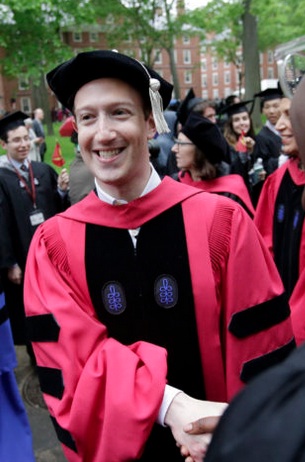Zuckerberg is making a provocative point that wasn’t in A World Without Work, the program we did a while back before there was any conversation here in the States about this basic income idea. My radar is out for what can shift mass consciousness and I tuned into this concept when it was being toyed with in a few foreign countries. Since then, it has become a topic of more and more conversation here that has some feel of being on the march to happening. If we had a system that’s about taking care of everyone, it would be a huge step toward the caring world we want to be in.
Mark Zuckerberg called for exploring universal basic income in his Harvard graduation speech. Here’s what that means.

Facebook CEO Mark Zuckerberg greets graduating Harvard students as he walks in a procession though Harvard Yard at the start of commencement exercises Thursday. –Steven Senne / AP
Online voting. Personalized learning. Student loan relief. Higher taxes on the wealthy.
But of all the ideas he suggested, perhaps none were as radical or surprising as a thing called “universal basic income.”
Zuckerberg said he never would’ve founded Facebook if not for his relative financial security, something other potential entrepreneurs may not enjoy.
“We should have a society that measures progress not just by economic metrics like GDP, but by how many of us have a role we find meaningful,” he said. “We should explore ideas like universal basic income to give everyone a cushion to try new things.”
So what does that mean?
Universal basic income is actually a pretty straightforward concept. And while there are varying degrees and iterations, at its core it’s a proposal that the government provides every citizen a certain baseline amount of money, no strings attached.
Vox.com’s Dylan Matthews, one of the preeminent journalists covering the subject, has called universal basic income “the world’s simplest plan to end poverty.”
It’s an idea that has picked up momentum in an age in which increased technological advance, globalization, and automation — especially automation — threaten countless livelihoods, as Zuckerberg noted during his speech Thursday.
“Our generation will have to deal with tens of millions of jobs replaced by automation like self-driving cars and trucks,” he said.
As The Atlantic recently reported, a startling number of American jobs could soon be eliminated due to automation, particularly in industries like shipping, manufacturing, retail, and telemarketing — as well as even insurance and accounting. According to a 2013 study, up to 47 percent of all American jobs could be at risk within “a decade or two.”
To a certain degree, universal basic income could address this looming issue by providing everyone a safety net of a certain amount of guaranteed money regardless of their employment status. And advocates argue a basic income would be generally more efficient than the current plethora of benefit programs the government currently administers to address poverty.
For those reasons, universal basic income receives broad, if not popular, support ranging from liberal economists and Martin Luther King Jr. to famous conservatives like Friederich Hayek and Milton Friedman — and even President Richard Nixon.
“Keep it simple, stupid,” David Frum, a conservative columnist, wrote in 2014, making a case that Republicans should push universal basic income as a means of welfare reform.
Detractors of the proposal say universal basic income would be a disincentive for individuals to work (studies have suggested the effect would be slight), weakening the economy and stripping individuals of the meaning in life. It’s certainly a question that’s up for debate (also up for debate is whether it would complement or substitute the current public safety net).
But Zuckerberg wasn’t buying that line of reasoning Thursday.
“Let’s give everyone the freedom to pursue their purpose — not only because it’s the right thing to do, but because when more people can turn their dreams into something great, we’re all better for it,” he said later during his speech. “Purpose doesn’t only come from work.”
But what does he know? After all, Zuckerberg did drop out of Harvard.

UBI is a fundamental idea whose time has not yet quite come. However, it is the only viable solution to the basic situations and that is so well brought forward by its advocates. If that is true, which most futurists agree upon, matters will conspire to bring it about.
I have been tracking this idea for ten years. Despite the fact that it seems outrageous given our work ethic, more and more people take it seriously. They are bigger and bigger names, more important in the public eye. UBI is appearing on ballots, it is being tried in smaller locations, and it is viable. What else is? It will surely come about. Just watch it unfold.
From your lips to God’s ear as they say. I’m don’t know about certainty, but when you pay attention you notice what you’ve said — that it is ever more seriously coming upon us. I can’t see anything else, either, that could deal with the fundamentals that would turn the world around, and am cheering all efforts and experiments at UBI that come thicker and faster all the time.